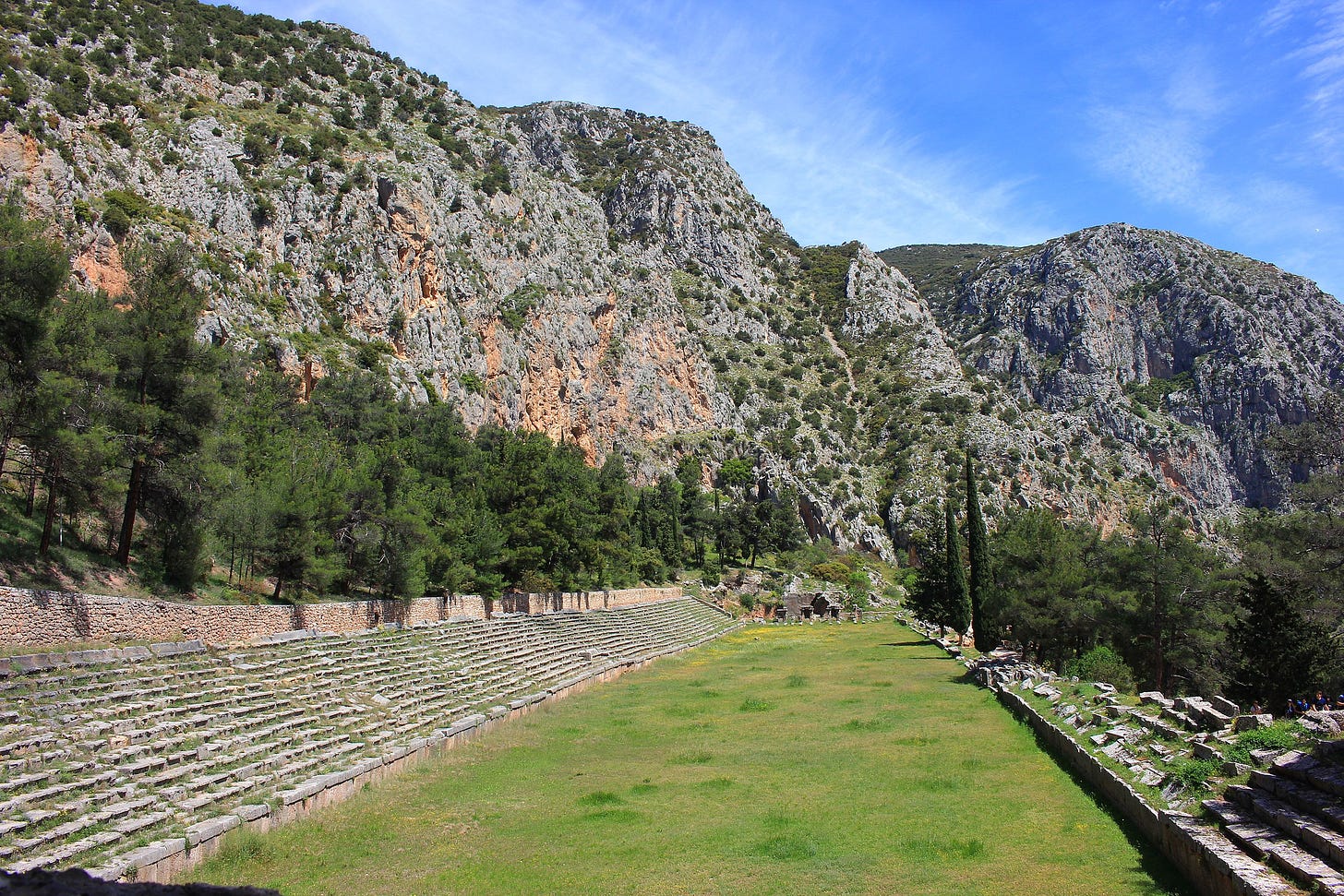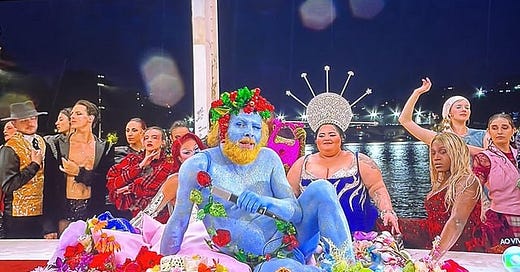I am not watching the Olympics as I used to in days gone by. I guess I’m getting a little tired of them.1
But it was hard to ignore the brouhaha over a part of the opening ceremonies in Paris, where some kind of song-and-dance routine was done which seemed to parody the famous painting of the Last Supper, Leonardo da Vinci’s depiction of the last night before the death of Jesus.
Part of the outrage had to do with the fact that among those purportedly parodying the Last Supper were men in drag. In the United States at least, drag queens are considered by conservatives as being extremely shameful. For those on the left, these are noble, creative people who are bravely expressing the empowerment of a group of human beings who for the longest time have been suppressed and vilified.
The routine continued with a big metal cover being taken off an enormous plate, under which a painted-blue, near-naked figure appeared. He was festooned with flowers and began to sing.
Some Christians immediately took this as an affront to the faith and a clear indicator that secular civilization had come to its lowest point.
Others responded that the tableau wasn’t anti-Christian at all, but actually from Greek mythology. The Olympics are originally Greek, the argument went. The blue figure is Dionysus, and he’s Greek, so the whole thing makes sense.
The organizers of the routine were also quick to disavow any mocking of Christianity, and to emphasize the connection between Dionysus and the Olympics.
Ehh. If you’ll forgive my saying so, I think there’s more to it than all that.
In Greece, the “Olympic” games weren’t the only athletic games.
The original Olympics happened every four years in a town in Olympia in the western Pelopponese, and were sacred to Zeus.
The other three years out of the cycle, games happened elsewhere.
The Pythian games happened in Delphi, and were sacred to Apollo.

The Nemean games happened in the Argolid, near the historic cities of Argos and Mycenae, and were also dedicated to Zeus.
Then there were the Isthmian games, which took place on the isthmus of Corinth. Poseidon was the honoree for these games.
You’ll notice a god’s name absent from this list: Dionysus.
That’s because Dionysus had nothing to do with athletics.
Dionysus is popularly known as the god of wine, but we might more properly term him as the master of temporary madness—that anti-civilized state of mind where people go nuts for a little while. Wine is a way of inducing that state, and Dionysus was also considered to be the principal of intoxication in wine which caused madness.
But Dionsysus also was the lord of the theater, which is another kind of temporary madness.
This involvement with theater gives us a hint into what Dionysus was really useful for in Ancient Greece: the idea that civilizations cannot continue without allowing for some temporary state of release from the strictures of ordinary civilization.
In other words, you need some time in the year where it’s okay to have role reversal, outrageousness, flaunting of the rules, and so on, for civilization to run well the rest of the time.
Festivals sacred to Dionysus did just that.
This was not the purpose of the Olympic Games in Ancient Greece.
If anything, this was a very sober time of competition where different city-states got the chance to showcase their best athletes. It was a time of forced peace—no wars were supposed to be happening at this time—and the religious aspect of the events were paramount.
In fact, a long time ago a scholar whom I greatly admire, David Sansone, wrote a really good book which argued that the games were literally a human sacrifice of sweat and energy to the gods.
Very sober. Very serious.
Therefore, it is not just that Dionysus is a Greek god and the Olympics were Greek that makes this outrageous spectacle okay, at least in the minds of its organizers.
No. In order to understand what’s going on, I think we need to bring in another viewpoint.
In Native American religion, there is a tradition of the clown.2
The clowns in this tradition are not people wearing a fake red nose and oversized shoes who come out of tiny cars at circuses. They are on purpose given the task of parodying, making fun of, and exposing the ridiculousness of religious ceremonies.
The clowns would actually interrupt sober ceremonies and do outrageous things, some of which makes our Dionysus routine look like family entertainment.
Regardless of the degree of transgression, it is clear to me that the drag queens and the blue Dionysus are in the tradition of Dionysian (and, analogously, Native American) rituals.
Somebody in the French Olympic Opening Ceremonies content-creating staff figured that to break up the sober nationalism of the Olympics, with the flag-waving and the torch-lighting and all the pomp and circumstance, you needed to have a time of clowning, role reversal, and release.
That’s what’s Ancient Greek about this whole thing.
I think the ancient Olympic Games would’ve been enlivened by a time of clowning, but that’s not what happened, according to the experts. Instead of Dionysian revelry—or even theatre itself—creativity (music, acting) was made into a competition.
Maybe that’s what’s really behind all the outrage with the clowning in Paris.
It had never really been done before.
In the prehistoric days of no internet, television was what you did for entertainment when you weren’t going to the movies or reading books, and during the Olympics, the best thing on TV was the Olympics. Nowadays, you’ve got more choices. I just watched “The Man Who Knew Too Much” on YouTube. Very good movie.
I was reminded again of the tradition of the Native American clown by the book The Four Vision Quests of Jesus, by Steven Charleston, a Native American bishop in the Episcopal Church whose own spiritual journey included reconciling Native American spirituality with Christianity. This book has a very attractive interpretation of what clowning accomplished in Native American spirituality.




I agree. I love Dionysus, and this upset has a definite Dionysian energy to it, especially when you factor in the transgressions of gender roles in his myths and rituals. I'm thinking especially of Dionysus dressing Pentheus in women's clothes and leading him to the bacchanal. A drag performance is perfect for him.